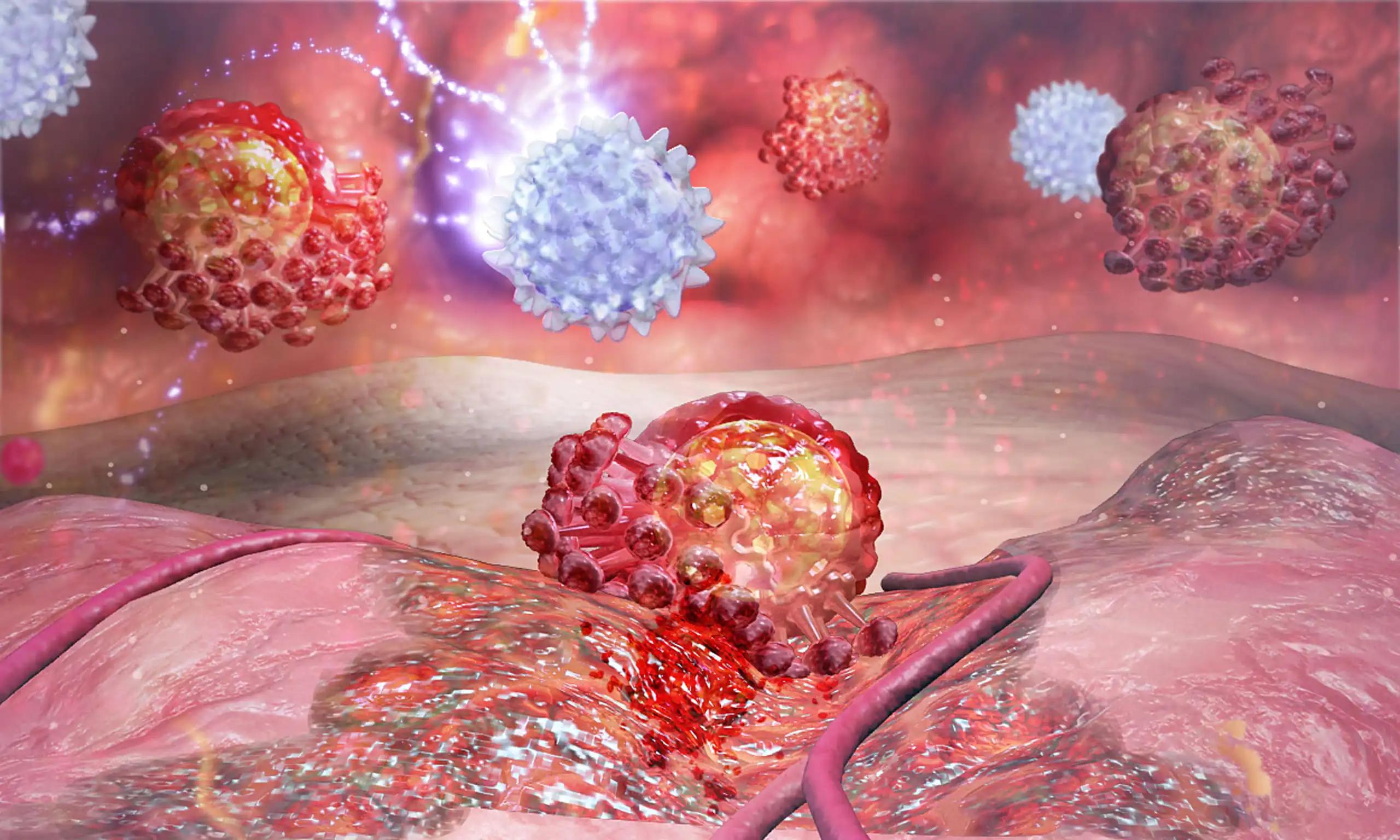KEY TAKEAWAYS
- Phase 2, randomized, clinical, open-label TRAIN-2 study for stage II and III ERBB2-positive breast cancer patients.
- The study aimed to evaluate 3-year EFS and OS of anthracycline-free and -containing regimens with dual ERBB2 blocking.
- The intention-to-treat analysis included 438 patients from 37 Dutch hospitals.
- Anthracyclines did not improve 3-year EFS or OS in stage II and III ERBB2-positive breast cancer patients.
- Anthracyclines were associated with a 10% or more significant reduction in left ventricular ejection fraction from baseline to less than 50%.
The most aggressive and complex breast cancer subtype, metastatic triple-negative breast cancer (mTNBC), has few treatment choices. Patients with mTNBC with a PD-L1+ tumor are eligible for first-line treatment with Immune-checkpoint inhibitors (ICI). However, overexpression of the ectoenzyme CD73 in the tumor microenvironment can produce immunosuppressive extracellular adenosine, reducing the efficacy of ICI and chemotherapy.
Patients with advanced or mTNBC who have not been treated before are being studied in the SYNERGY trial to see if including an anti-CD73 monoclonal antibody, oleclumab, improves the clinical benefit (CB) of chemotherapy combined with an anti-PD-L1 antibody, durvalumab. In this report, researchers offer findings from the initial 68 patients who were eligible for investigation. Carboplatin AUC 1.5 and paclitaxel 80 mg/m2 q1w x 12 in combination with durvalumab 1500 mg q4w with (Arm A) or without (Arm B) oleclumab 3000 mg q2w x5 followed by 3000 mg q4w based on the recommended phase 2 dose were randomized to treat patients with previously untreated inoperable locally advanced or mTNBC.
After chemotherapy, immunotherapy was used for maintenance. Clinical benefit rate (CBR) at week 24 was defined as complete response, partial response, or stable disease according to RECIST 1.1. The critical hypothesis was that adding oleclumab increased the CBR by 20% (1-sided =0.1 and 80% power with 68 pts/arm; 150 pts to be enrolled). To stratify patients, baseline tumor tissue was evaluated for CD73 immunohistochemistry (IHC) and PD-L1 expression. The Lan-Demets method determined the cutoff to be z test < 0.074, p=0.464.
The primary examination of safety and usefulness data was examined by an independent data monitoring committee (IDMC). On April 2, 2021, the 68th evaluable patient reached week 24. The baseline features of the patients in each group were comparable. About 28 out of 33 patients (84.9%) in Arm A and 21 out of 35 patients (60.0%) in Arm B experienced AEs of grades 3-4 (p=0.03). Hematological toxicities, specifically neutropenia (17/33 [51.5%] and 12/35 [34.3%] in Arm A and 5/33 [15.2%] and 1/35 [2.9%] in Arm B), were the most common grade 3-4 AE. Arm A with oleclumab did not show an increase in immune-related adverse events. 15/33 patients (45%) in Arm A and 17/35 (49%) in Arm B met the CB criteria. Z = -0.2574, p = 0.69 (one-sided Fisher’s exact), which means the point of no return has been reached. No discernible differences in CBR were found when patients were divided into groups based on their PD-L1 status or CD73 IHC expression.
The IDMC suggested ending recruitment after seeing these numbers. After informing patients of these preliminary outcomes, durvalumab and oleclumab medication can be continued. At the time of the interim analysis, it was found that both groups’ responses persisted with immunotherapy maintenance. For patients with advanced or mTNBC, adding oleclumab to the standard first-line treatment of carboplatin, paclitaxel, and durvalumab did not significantly improve CBR at 6 months. This means the CBR for the entire population in arm A was 45%, with durable responses and a manageable safety profile. The survival benefit needs to be evaluated over a longer period. To further understand the processes associated with response and resistance to the trial regimens and to define particular subgroups of patients with TNBC who potentially benefit from ICI and adenosine-targeting drugs, more research is needed using blood and tissue samples acquired during the trial.
Source:http://app.core-apps.com/sabcs2021/abstract/c31e95c2-bf8b-4578-812c-b2b10f4837d0
Clinical Trial:https://clinicaltrials.gov/ct2/show/NCT03616886
Veronique Debien, Christian Maurer, Philippe Aftimos, Florian Clatot, Delphine Loirat, Kevin Punie, François Ghiringhelli, Anhony Gonçalves, Donatienne Taylor, Tom Van den Mooter, Jean-Marc Ferrero, Hervé Bonnefoi, Jean-Luc Canon, François Duhoux, Renaud Poncin, Fernando Bazan, Nicolas Isambert, Philippe Barthelemy, Mariana Brandão, Paulus Kristanto, Michail Ignatiadis, Martine Piccart and Laurence Buisseret/OT1-18-02 – First-line chemo-immunotherapy with durvalumab, paclitaxel and carboplatin with or without anti-CD73 antibody oleclumab in advanced or metastatic triple-negative breast cancer: Preliminary results of the randomized phase II SYNERGY trial/2021 San Antonio Breast Cancer Symposium. (n.d.). App.core-Apps.com. Retrieved April 6, 2023, from http://app.core-apps.com/sabcs2021/abstract/c31e95c2-bf8b-4578-812c-b2b10f4837d0



